

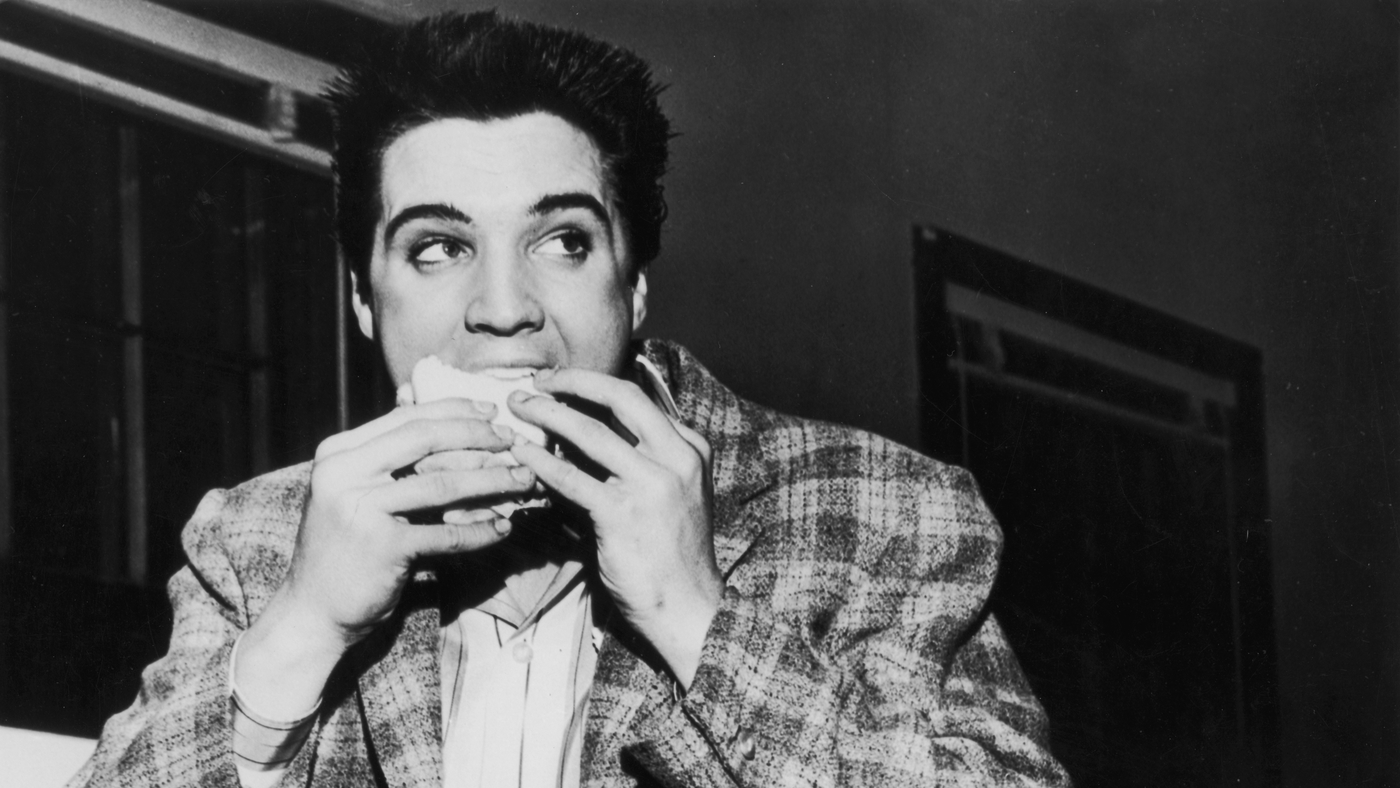
Did A Glendale Sandwich Kill Elvis Presley?
by Mark Smiley
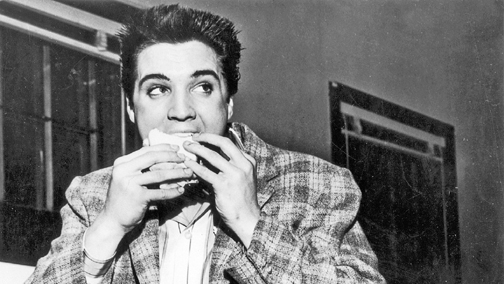
Elvis In The Building: Elvis Presley, seen here eating a “Fools Gold” sandwich at the Colorado Mine Company in Glendale, once boarded his private jet from Memphis and flew 1,000 miles to have a midnight snack in Glendale.
The “King of Rock and Roll” Elvis Presley died on August 16, 1977, at his home in Graceland purportedly sitting on a porcelain throne in his bathroom. The cause of his death at age 42 was cardiac arrhythmia, i.e. a heart attack. Some of his admirers have blamed his death on the “Fools Gold” sandwich from the Colorado Mine Company in Glendale, Colorado, while others have blamed it on the potpourri of drugs that flowed through his system at the time. But fans claim the “Fools Gold” sandwich was, in fact, deadlier for the heart than almost any drug.
The sandwich consisted of an entire loaf of sourdough bread with massive amounts of peanut butter and blueberry jam along with crisp bacon. The sandwich was an alternative, fun staple at the Colorado Mine Company which was an upscale steak, lobster and prime rib restaurant in the heart of Glendale. On East Virginia Avenue, p

Good Old Days: The Colorado Mine Company was a hot spot along Virginia Avenue in Glendale in the 1970s and 1980s.
rofessional athletes, rock stars and other celebrities hung out at the establishment when they came to Denver during Glendale’s entertainment heyday in the 1970s and early 1980s.
The Colorado Mine Company was owned by Buck and Cindy Scott. The Lift Nightclub was across the street and Mr. Lucky’s was next door, which was purportedly owned by the Detroit mob. Adjoining the Colorado Mine Company was Glendale’s Municipal Wastewater Plant. The restaurant had large bay windows which looked out upon a scenic pond that, in fact, was a wastewater pool but, in the moonlight, appeared highly romantic.
The Colorado Mine Company under Buck and Cindy’s aegis began in 1971 with 16-year-old chef Nick Andurlakis, the progenitor of the “Fools Gold” sandwich at the food helm. “We took off pretty good. We were doing 2,000 dinners per night,” said Andurlakis. The restaurant in its heyday served the 2,000 meals nightly at 400 tables.
The restaurant closed with the demise of the oil boom in 1982. Among the celebrities who hung out there were Clint Eastwood and his wife, Davey Jones the lead singer for the Monkees, as well as actor Telly Savalas. But there was no greater star at the time than Elvis Presley, who visited the restaurant on eight different occasions.
Although Elvis is gone, Andurlakis is not and, in fact, owns and operates Nick’s Café at 777-1/2 Simms Street in Golden. Elvis memorabilia adorns the walls of his café with a story behind each picture. Every year on Elvis’s birthday, January 8, many of the King’s fans flock to the café to partake in the “Fool’s Gold” Sandwich.
Elvis loved the sandwich so much that on February 1, 1976, he took his private jet to Denver in order to have a midnight snack. Elvis arrived in Denver and was greeted at 1:40 a.m. by Buck and Cindy Scott of the Colorado Mine Company carrying 22 fresh Fool’s Gold Loaves. He was then escorted to the restaurant by a platoon of Denver police officers led by Jerry Kennedy, then Chief of Police of the City and County of Denver.
Elvis ate three 8,000 calorie sandwiches and gave two to his daughter L
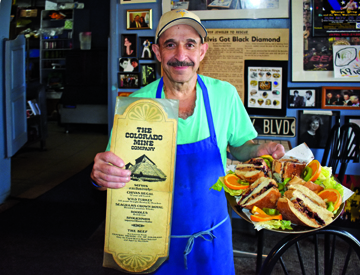
Still Serving: The “Fools Gold” sandwich is still available at Nick’s Café in Golden. He is pictured here holding the original Colorado Mine Company menu and the original platter he served the sandwich on to Elvis. Nick Andurlakis has operated his café for 32 years. It is open 5 a.m. to 2 p.m. every day.
isa Marie. Andurlakis still has the platter on which he delivered the five sandwiches.
Andurlakis remembers Elvis fondly. One time, Elvis noticed that Nick was looking at and admiring his necklace. Elvis took it off and put it on his neck telling him it was now his and no amount of protestations from Andurlakis would deter him. Andurlakis has never taken the necklace off from the time it was given to him by Elvis except for an operation when he was given no choice in the matter.
The cost of the sandwich at the Mine Company was $37.95, but on the menu it was stated, “This price is negotiable. (Inflation is killin’ us!).” Andurlakis states that Buck and Cindy would tell the waitresses that anything over $20, they were to keep for themselves. Since the waitresses were often extremely attractive and the normal male consumer may have been drinking prodigiously they often got more than the list price of $37.95.
Elvis impersonators love to stop by Nick’s Café and partake in the sandwich. Cody Ray Slaughter, an award-winning Elvis Tribute star, who has appeared on such shows as the Late Show with David Letterman, was recently in town appearing at the Lakewood Cultural Center. He reports that you cannot perform for several hours after consuming a “Fools Gold” sandwich as the peanut butter stays with you for hours.
In light of Glendale looking forward to bringing back its entertainment district along Virginia Avenue, to be titled Glendale 180, members of the Greater Glendale Chamber of Commerce are hoping to lure Andurlakis back to Glendale for a special event. Sometime during this occasion, the mayor might present him a key to the city. No better way, it is thought, to bring Glendale’s past and present together.
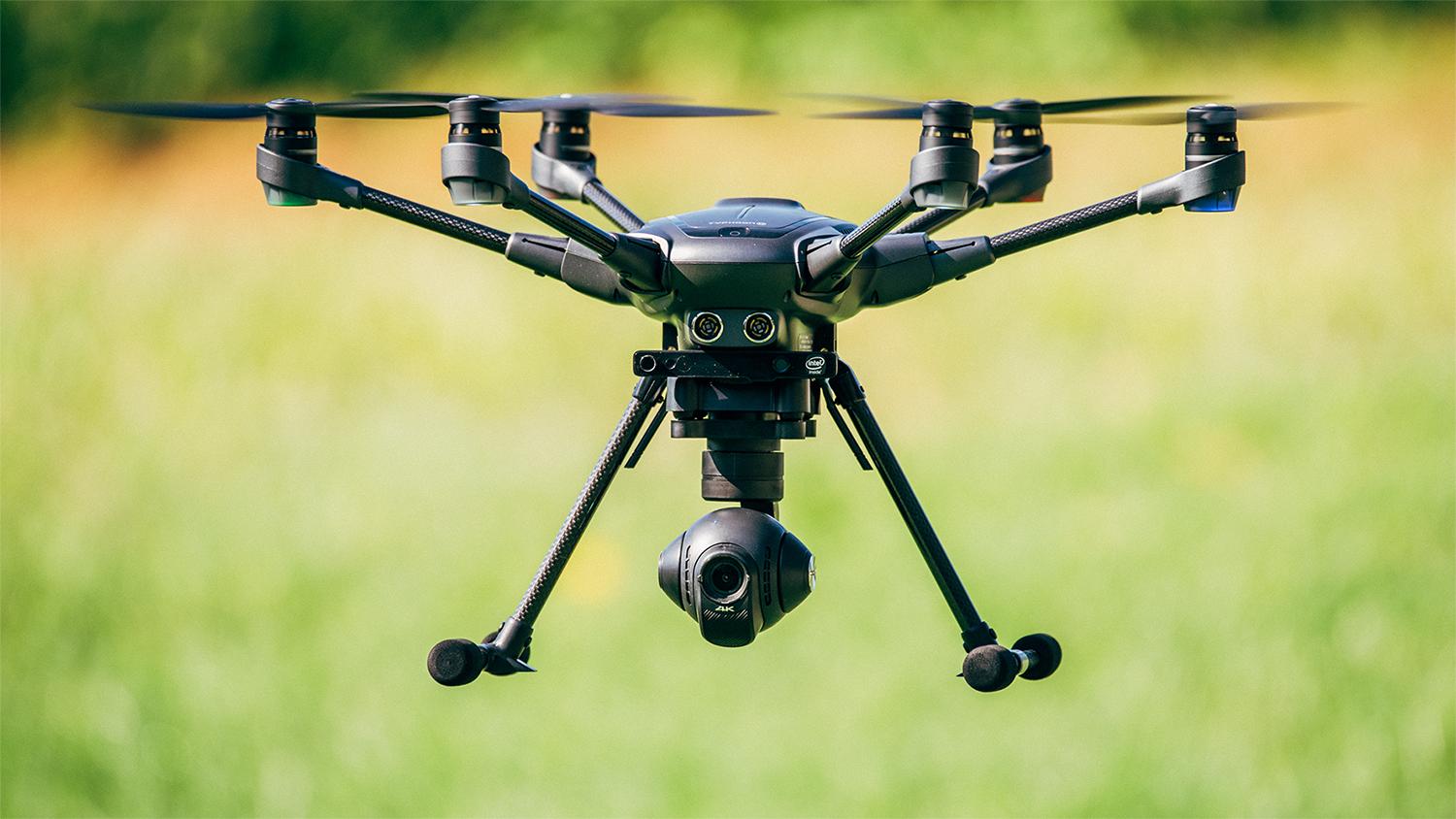
Drones Over Denver
Flying Machines Impact Valley’s Workplace, Output; Altering Local Real Estate, Events, Construction, Mining
by Glen Richardson

Drones Over Denver: There are no specific rules for drones in Denver other than they are not allowed in parks or within a five-mile radius of any airport. They are allowed to fly at or below 400 ft., or about as high as a 40-story building.
To be sure drones aren’t yet as American as apple pie. Experts predict, however, that within the next decade unmanned aircraft systems (UAS) or drones will be as indispensable as the cell phones we carry everyday — tools that make us productive, safer and more connected.
Delivery of doughnuts to Denver’s mayor a year ago has thus far been the city’s single significant drone headline. Can’t drones wing it over the Rocky Mountains?
Despite creating little buzz locally, drone dealings are booming and doing double duty in Denver. Consider these examples:
Top Denver Deals
- Xcel Energy is the first utility in the nation to routinely fly drones beyond the operator’s line of sight as it surveys transmission lines around Denver;
- The University of Colorado at Denver offers a Drones 101 course that is the only academic one of its kind in the country;
- Valley drone company Juniper Unmanned has performed unmanned aircraft missions for companies on six continents;
- Drone companies did live demonstr
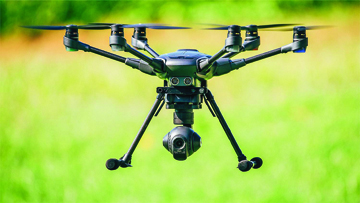 ations on the roof of the Convention Center when Denver hosted XPONENTIAL, the world’s largest drone expo this summer; and
ations on the roof of the Convention Center when Denver hosted XPONENTIAL, the world’s largest drone expo this summer; and - Denver-based Lockheed Martin is offering a $2 million prize in its Drone Challenge titled AlphaPilot.
Donut Delivery Dunked
Amazon, Google and Walmart are experimenting with drone delivery but despite the publicity it is not on Denver’s immediate radar. That’s in spite of the successful delivery of donuts to the mayor.
Why? Deliveries require a lot of work, more powerful drones, better battery life and extremely smart systems that can prevent collisions with people, aircraft and power lines.
Drones also need to be able to verify that they’re delivering something to you and that they’re leaving it in a safe place.
Out Of Sight Flights
In January of last year with FAA approval (2017), Xcel Energy began to operate drones within operators’ visual sight for power line inspections. The work established that drones improved productivity and safety without the use of trucks, helicopters or other utility equipment. Xcel inspects more than 320,000 miles of electricity and natural gas infrastructure to ensure the safety and reliability of its energy systems.
This summer the Federal Aviation Administration announced it had also authorized Xcel drone flights out of the operator’s line of sight. The FAA’s decision to allow these flights is unprecedented in the utility industry, the company says. “Xcel Energy is honored to be the first utility to conduct flights that will enhance grid reliability and safety for our employees and the public,” says Ben Fowke, chairman-CEO. “With this groundbreaking decision, we are advancing the use of technology that improves our efficiency and prov
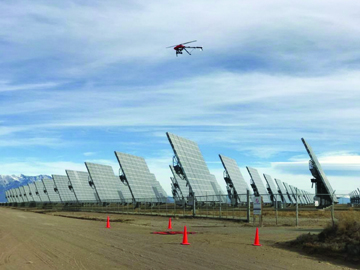
Nation’s First: Xcel Energy is the first in the nation authorized to fly drones beyond the operator’s visual line of sight. Flights are within a designated area north of Denver to inspect assets.
ides cost savings for customers.”
The company is now routinely operating drones beyond the visual line of the operator’s sight within a designated area north of Denver. Licensed pilots remotely operate small, unmanned drones that look like helicopters weighing less than 55 lbs.
Drone Academics
Housed at CU Denver’s College of Engineering & Applied Sciences is a course titled Unmanned Aerial Systems. Often described as Drones 101, it is teaching a new generation of scientists about applications and research opportunities afforded by unmanned aircraft.
Taught by Jeff Cozart who also happens to be the chief executive officer of Juniper Unmanned — the leading drone company in the world — students are taught mission planning, UAS operations, collection procedures, data processing and analysis. Students also study the legal, ethical and economic implications of drone use.
Offered since 2014 and believed to be the only academic course of its kind in the country it has made Denver the nation’s scholastic leader in Unmanned Aerial Systems. Furthermore, Cozart is a member of the Aviation & Aerospace Science faculty at Metropolitan State University of Denver, where he teaches undergraduate courses in unmanned aircraft.
Business-Industry Leader
Valley drone company Juniper Unmanned is the world leader in unmanned aircraft missions for business and industry. Named the 2018 Colorado Company to Watch, the Golden-based firm has conducted operations on six of the world’s seven continents. Among the firm’s clients are Disney, AECOM, Caterpillar, Trimble, Rio Tinto, the U.S. Geological Survey, the Office of Surface Mining, the Bureau of Land Management and Department of Energy.
The company has completed work ranging from complex urban centers to remote, environmentally sensitive locations. Work is conducted from roads, bridges, earthen dams and power plants.
The company also provides drone solutions for commercial, federal, state, and military organizations. The company integrates best-in-class aircraft with the most advanced sensors. When combined with Juniper’s engineered processes, advanced software, and analytics, clients receive unmatched data and actionable intelligence to improve their business.
Has World’s Eye
After considering sites in San Francisco and New York, Propeller Aero, an Australian maker of drone software for construction and mining has landed in a 3,200-sq.-ft. space on Larimer St. downtown.
After closing on a $10 million round of funding in June, the Sydney-based company has hired a dozen Denver employees and expects the number to double. The firm was founded as a drone data company for mining, construction and waste-management in 2014.
Now, Propeller helps companies set up and fly a drone, then stitch together the photos it shoots into a 3D model to show customers how deep a hole has been dug, how much dirt is in a pile or the various gradients of a surface. In addition, the company produces AeroPoints, a hardware square plate that surveyors lay down on a site that collects data from drones.
Photos & Prizes
Commercial drones are revolutionizing Valley mining, construction and civil engineering. Drones are being used to survey building and the surrounding landscape. Equipped with cameras, GPS and rangefinder measurement tools they provide a detailed bird’s-eye perspective of projects. Some construction drones also have thermal imaging scanners that identify hot and cold spots on projects. A cold spot could indicate insufficient installation, hot spots an electrical problem. Drones can also inspect hard-to-reach areas such as the roofs of high-rise buildings.
Denver realtors are now using portfolios of drone photography to sell property. Drone film companies or realtors themselves shoot and use a diverse mix of aerial camera work from a variety of altitudes and angles. Drones are also now commonly used to shoot weddings and other Valley special events. Keeping their feet on the ground, companies such as Littleton’s Lupher Arts Wedding Motion Pictures use these flying machines to capture breathtaking shots.
Finally, Denver-based Lockheed Martin is offering drone enthusiasts a $2 million design prize. The Challenge: Design an artificial intelligence and machine-learning (AI/ML) framework capable of flying a drone though several professional drone racing courses without human intervention or navigational pre-programming.

Do I Need To Sleep And Relax To Be ‘Fit?’
by Mcyveton Pierre-Louis
 We all hear that it’s important to get sufficient sleep. But maybe we’re not sure why — especially since the things we need to do to be healthy typically involve exercising and eating right. Why then are sleep and relaxation so important to overall fitness and wellness?
We all hear that it’s important to get sufficient sleep. But maybe we’re not sure why — especially since the things we need to do to be healthy typically involve exercising and eating right. Why then are sleep and relaxation so important to overall fitness and wellness?
The reasons are plenty. Mentally, getting the correct amount of quality sleep is essential to your ability to learn and process memories. It helps you be well rested so you can concentrate and focus throughout the day. Physically, sleep helps restore your body’s energy and repair muscle tissue. It also triggers the release of hormones that affect growth and appetite.
How much sleep do I need?
How much sleep you need varies based on age. The National Heart, Lung and Blood Institute recommends at least 11 to 12 hours per night for preschool-aged children, 10 hours for school-aged children, nine to 10 hours for teens, and seven to eight hours for adults.
Getting in those hours is important, but it’s also essential that the sleep is good quality. Frequent interruptions or not getting enough deep REM sleep can diminish the benefits.
Many people think older people need less sleep. Another myth is that people can “make up” lost sleep on the weekends, or that just losing an hour or so of sleep a night will not have adverse effects. The reality is that older people are more apt to have insomnia or medical conditions that disrupt sleep. And losing sleep at any time, consistently, at any age, can eventually affect your health.
If I can’t sleep, will just relaxing help?
While relaxation is not a substitute for sleep, it can be beneficial for relieving stress and anxiety, which can promote sleep. Relaxation techniques can include meditating, laying down resting, or focusing on deep breathing.
What if I have problems falling asleep?
Knowing the importance of sleep can be frustrating if you’re struggling to get enough of it. And if you do have difficulties falling and staying asleep, you are not alone. According to the Sleep Health Foundation, one out of three people experience at least mild insomnia, and women are twice as likely to have insomnia than men.
If getting sleep is challenging for you, try these tips:
- Stick to a routine. Aim to head to bed and wake up around the same time each day.
- Unplug. Try not to watch TV or work on your computer in bed. Stop an hour beforehand so your mind has time to unwind.
- Exercise. Getting the appropriate amount of exercise benefits nearly all aspects of your health, including sleep. Adults should strive for two and a half hours of moderate activity per week, and children need one hour per day. Try to increase your activity, but be sure to stop exercising two to three hours before bedtime.
- Create a sleep environment. Make sure you have the appropriate surroundings — a dark room, a good mattress, and a pillow that supports your head and neck.
- Avoid caffeine and nicotine. These are stimulants that can disrupt sleep. And smoking can cause you to wake up early due to nicotine withdrawal.
- Skip the late-night meal. Snacking is okay, but eating a large meal before bed can cause indigestion, which can disrupt sleep.
- Relax before bed. Take a hot bath, listen to music, or read.
- Do not force it. If you’re unable to fall asleep within 20 minutes, return to a relaxing activity. Lying in bed awake can result in anxiety or stress that will make falling asleep even more difficult.
Sleeping provides essential benefits, both physically and mentally. And getting enough sleep can help you stay focused, reduce stress, and function at your best.
Mcyveton Pierre-Louis is the Member Experience Director at the Littleton Family YMCA. Certified by LiveStrong, NSCA, and YMCA, Mcyveton believes exercise is about a lifestyle change. He loves to help people reach their goals and push to the next level.
